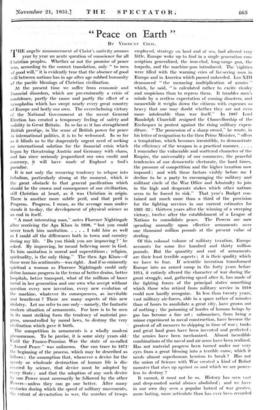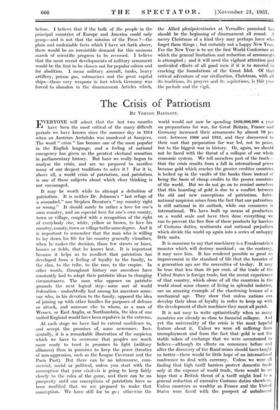" Peace on Earth "
By VISCOUNT CECIL.
r IHE angelic announcement of Christ's nativity. arouses year by year an acute question of conscience for all Christian peoples. 'Whether or not the promise of peace was, according to the correct translation, only " to men of good, will," it is evidently true that the absence of good will between nations'has in age after age robbed humanity of the pacific blessings of Christian civilization.
At the present time we suffer from economic and financial disorders, which are pre-eminently a crisis of confidence, partly the cause and partly the effect of a xenophobia which has swept nearly every great country of Europe and lastly our own. The overwhelming victory of the National Government at the recent General Election has created a temporary feeling of safety and solidity in Great Britain. In so far as it has strengthened British prestige, in the sense of British power for peace in international politics, it is to be welcomed. In so far as it blinds us to the desperately urgent need of seeking an international solution for the financial crisis which began by threatening Austria and Germany with chaos, and has since seriously jeopardized our own credit. and currency, it will haVe made of England a fool's paradise.
It is not only the recurring tendency to relapse into tribalism, particularly strong at the moment, .which is the great obstacle to that general pacification which should be the crown and consequence of our civilization, still Christian at heart, as it was Christian in origin. There is another more . subtle peril, and that peril is Progress. Progress, I mean, as the average man under- stands it to-day, the development of physical science as an end in itself.
" A most interesting man,".notes Florence Nightingale after receiving the Aga Khan in 1898, " but you could never teach hint sanitation - I told him as well as I could all the differences both in town and country during my life. ' Do you think you are improving ' he asked. By improving, he meant believing more in God. To him sanitation is unreal and superstitious ; religion, spirituality, is the only thing." The then Aga Khan—if those were his sentiments—was right. And if so eminently spiritual a woman as Florence Nightingale could only define human progress in the terms of better drains, better hospitals, better transport, what of the millions of baser metal in her generation and our own who accept without question every. new invention, every new evolution of the machine, whatever its consequences, as inevitable and beneficent ? There are many aspects of- this new idolatry. -Let me refer to one only—namely, the fantastic modern situation of armaments. For here is to be seen in its most striking form the tendency of material pro- gress, uncontrolled by moral laws, to destroy the very civilization which gave it birth.
The competition in armaments is a wholly moderi • phenomenon. To be precise, it is some sixty years old:' Until the Franco-Prussian War the state of so-called • " Armed Peace " was unknown. • One can trace to 1871" the beginning of the process, which may be described as fellows : the assumption that, whenever a device for the speedy or wholesale destruction of human life is dis- covered by. science, that device must be adopted by ; every State and that the adoption of any such device by one Power must necessarily be followed by the other Powers----unless they can go one better.' After many centuries during which the speed of military- movements, the extent of devastation in war, the number of troops employed, strategy on land and at sea, had altered very little, Europe woke up to find in a single generation con- scription generalized, the iron-clad, long-range gun, the torpedo, and the machine-gun introduced. The 'eighties were filled with the warning cries of far-seeing men in Europe and in America which passed unheeded. Leo XII denounced " the menacing multiplication of armies " which, he said, " is calculated rather to excite rivalry- and suspicions than to repress them. It troubles men's minds by a restless expectation of coming disasters, and meanwhile it weighs down the citizens with expenses so heavy that one may doubt whether they are not even more intolerable than war itself." In 1887 Lord Randolph Churchill resigned the Chancellorship of the Exchequer in protest against the rising military expen- diture. • " The possession of a sharp sword," he wrote, in his letter of resignation to the then Prime Minister, " offers a temptation, which becomes irresistible, to demonstrate the efficiency of the weapon in a practical manner I remember the vulnerable and scattered character of the Empire, the universality of our commerce, the peaceful tendencies of our democratic electorate, the hard times, the pressure of competition and the higher taxation now imposed ; and with these factors visibly before me I decline to be a party to encouraging the military and militant circle of the War Office and Admiralty to join in the high and desperate stakes which other nations seem to be forced to risk." That year's Budget con- tained not much more than a third of the provision for the fighting services in our current estimates for 1931-32 ; thirteen years after the winning of a sweeping victory, twelve- after the establishment of a League of Nations to consolidate peace. The Powers are now spending annually upon effective armaments over one thousand million pounds at the present value of sterling. Of this colossal volume of military taxation, Europe accounts for sonic five hundred and thirty million pounds. But the quantity and cost of armaments are their least terrible aspects ; it is their quality which we have to fear. If scientific invention transformed Europe into an armed camp in the forty years before 1914, it entirely altered the character of war during the great struggle, and, gathering speed after it, has made of the fighting forces of the principal states something which those who retired from military service in 1918 could now hardly recognize. In less than twenty years; vast military air-forces, able in a space rather of minutes than of hours to annihilate a great city, have grown out of nothing ; the poisoning of hordes of human beings by gas has become a fine art ; submarines, front being a minor experiment in naval construction, have become the greatest of all menaces to shipping in time of war ; tanks and great land guns have been invented and perfected ; the armies have been mechanized. Almost incredible combinations of the naval and air arms have been realized. Has not material progress been turned under our very eyes from a great blessing into a terrible curse, which it needs almost superhuman heroism- to break ? Has not the union of Science with War created a kind of Robot monster that rises up against us and which we are power- less to destroy ?
It cannot, it must not be so. History has seen vast and deep-rooted social abuses abolished ; and we have in our own day seen a popular hatred of war greater, more lasting, more" articulatethan has ever been recorded before. I believe that if the bulk of the people in the principal countries of Europe. and America could only grasp—and is not that the mission of the Press ?—the plain and undeniable facts which I have set forth above, there would be an irresistible demand for this ominous march of scientific progress to be reversed. I believe that the most recent developments Of military armament would be the first to be chosen out for popular odium and for abolition. I mean military aircraft, tanks, heavy artillery, poison gas, submarines and the great capital ships—those very weapons in fact which Germany was forced to abandon in the disarmament Articles which, the Allied plenipotentiaries at Versailles promised her should be the beginning of disarmanient all round. A merry Christnias of a kind they may perhaps have who forget theSe things ; but certainly not a happy New Year. For the New Year is to see the first World Conference at which the general limitationand reductiOn of armaments is attempted ; and it need the Vigilant attention acid undivided efforts of all good men if it is to succeed' in Cracking the foundations of the Great Idol. Of . that critical ad4enture of our civilization, Christmas, With all its traditions, its prayers and its aspirations, is thiS year the prelude and the vigil.

































































 Previous page
Previous page